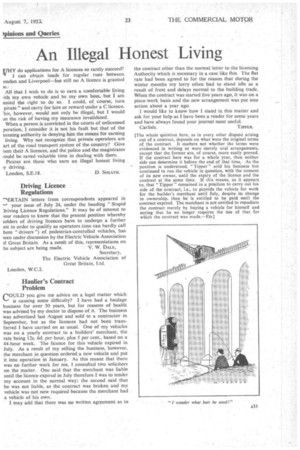pinions and Queries
Page 55

If you've noticed an error in this article please click here to report it so we can fix it.
An Illegal Honest Living
VHY do applications for A licences so rarely succeed? I can obtain loads for regular runs between ondon and Liverpool—but still no A licence is granted ie.
All that I wish to do is to earn a comfortable living pith my own vehicle and be my own boss, but I am enied the right to do so. I could, of course, turn pirate" and carry for hire or reward under a C licence. 'his, however, would not only be illegal, but I would in the risk of having my insurance invalidated.
When a person is convicted in the courts of unlicensed peratiort, I consider it is not his fault but that of the eensing authority in denying him the means for earning living. Why not recognize that private operators are art of the road transport system of the country? Give lem their A licences, and the police and the magistrates yould be saved valuable time in dealing with them. Pirates are those who earn an illegal honest living ry driving.
London, S.E.18. D. SHEATH.
Driving Licence Regulations
–"ERTAIN letters from correspondents appeared in your issue of July 24, under the heading "Stupid )riving Licence Regulations." It may be of interest to tour readers to know that the present position whereby tolders of driving licences have to undergo a further est in order to qualify as operators (one can hardly call hem "drivers ") of pedestrian-controlled vehicles, has )een under discussion by the Electric Vehicle Association )f Great) Britain. As a result of this, representations on .he subject are being made. V. W. DALE, Secretary, The Electric Vehicle Association of Great Britain, Ltd.
London, W.C.2,
Haulier's Contract Problem
rOULD you give me advice on a legal matter which is causing some difficulty? I have had a haulage business for over 30 years, but for reasons of health was advised by my doctor to dispose of it. The business was advertised last August and sold to a contractor in September, but as the licences had not been transferred I have carried on as usual. One of my vehicles was on a yearly contract to a builders' merchant, the rate being 12s. 6d. per hour, plus 5 per cent., based on a 44-hour week. The licence for this vehicle expired in July. As a result of my selling the business, however, the merchant in question ordered a new vehicle and put it into operation in January. As this meant that there was no further work for me, I consulted two solicitors on the matter. One said that the merchant was liable until the licence expired in July therefore I was to tender my account in the normal way; the second said that he was not liable, as the contract was broken and my vehicle was not now required because the merchant had a vehicle of his own.
I may add that there was no written agreement as to the contract other than the normal letter to the licensing Authority which is necessary in a case like this. The flat rate had been agreed to for the reason that during the winter months my lorry often had to stand idle as a result of frost and delays normal to the building trade. When the contract was started five years ago, it was on a piece-work basis and the new arrangement was put into action about a year ago.
1 would like to know how I stand in this matter and ask for your help as I have been a reader for some years and have always found your journal most useful.
Carlisle. TIPPER.
[The whole quegtion here, as in every other dispute arising out of a contract, depends on what were the original terms of the contract. It matters not whether the terms were evidenced in writing or were merely oral arrangements, except that the former are, of course, more easily proved. If the contract here was for a whole year, then neither side can determine it before the end of that time. As the ' position is understood, " Tipper " sold his business but continued to run the vehicle in question, with the consent of its new owner, until the expiry of the licence and the contract at the same time, If this means, as it appears to, that " Tipper " remained in a position to carry out his side of the contract, i.e., to provide the vehicle for work for the builder's merchant until July, despite its change in awnership, then he is entitled to be paid until the contract expired. The merchant is not entitled to repudiate the contract merely by buying a vehicle for himself and saying that he no longer requires the use of that for which the contract was made.—ED.]
























































































